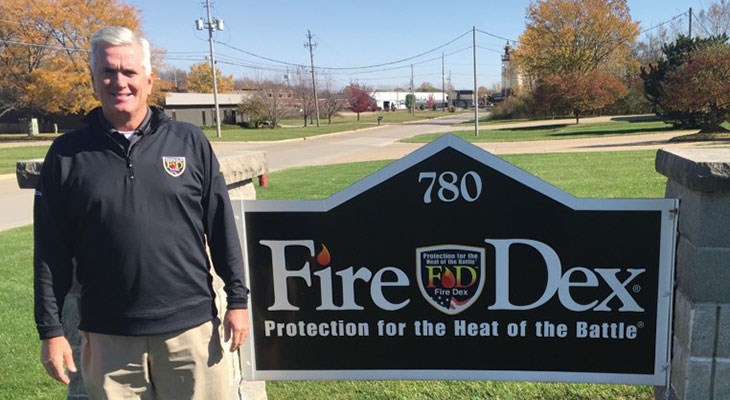Dealmaking is all about creating opportunities to be more productive, says Fire-Dex CEO Bill Burke.
“We look for companies that have a tremendous amount of growth potential,” says Burke. “One of the things we’re very good at is managing growth and turning a company around. All four of the companies we’ve acquired in the last decade were performing, but not to the level they are performing today. They were all good, but they had the opportunity to become stellar.”
Fire-Dex is a manufacturer of head-to-toe protection for first responders, including turnout gear, boots, hoods, gloves, helmets and other types of protective equipment. The Medina-based company doesn’t have a lot of competition, as there are only 10 to 15 companies worldwide in the fire protective gear industry. That reality hasn’t diminished Burke’s determination to continue finding ways to build his business.
“Acquisitions provide an opportunity to look at other businesses, to benchmark from other businesses, to try to learn something from other businesses,” Burke says. “I think it’s very helpful.”
In this Dealmaker Q&A, we spoke with Burke about the approach Fire-Dex takes to acquisition strategy.
What do you look for in an acquisition opportunity?
We look both in our own space and in contingent spaces. The acquisition we made earlier this year was Gear Wash, based in Milwaukee. They clean and repair the gear that both Fire-Dex and our competitors manufacture. It was a new space for us to be in, and it gives us the opportunity to deal more often and more directly with fire departments. While our traditional business is sold through a dealer network, our gear wash business is sold direct to fire departments.
The acquisition we made in 2018 was primarily a play for additional production capacity. The company was in the business of manufacturing U.S.-made shirts for the U.S. Postal Service and the U.S. Navy. These were required to be manufactured in the United States. We operated in that space for a period of time, but our primary objective was to have this company provide additional Fire-Dex production capacity, which is what it does exclusively today.
How do you approach a potential acquisition target?
I keep an active list of companies that I have interest in. Every quarter or so, I'll reach out to them and see if anything has changed. Do they want to increase our discussion levels so that we can get things moving along? The most important thing is to talk early, to be the first person that is reaching out to these companies and saying, ‘Hey, we'd be interested in partnering with you.’
Be upfront and honest. The former owner needs to have a tremendous amount of patience because he’s used to making all the decisions. And now those decisions are going to be made by somebody else.
That’s a difficult transition for a lot of owners to undertake. It’s also good to have a contract that makes it very simple to understand how things will work and, if this relationship doesn’t pan out for either one of us, how we can exit the relationship in a smooth fashion.
Do you have a preference on the role a seller takes after selling a business?
Having some transition is important because it’s difficult during due diligence to get enough knowledge about day-to-day operations. Every day is slightly different for these organizations as different things comes up. So having at least a 90-day transition period is helpful. With some organizations, maybe it’s a forever relationship. It depends on that individual’s objectives and what our needs are.
What’s another key to your acquisition strategy?
It’s paramount to have a good team in place. Steve Allison is our president and I have a CFO who’s been with me for 29 years and a vice president of operations who has been with me for 16 years. Without those three guys, I couldn’t do any of these deals.
Having the right team is paramount to success. Having some controversy and dialogue is critically important to make sure that we flush through the challenges and opportunities, so we make sure we’re doing the right thing.
Related: Fire-Dex chases the 80 percent of the market share it’s yet to own.




